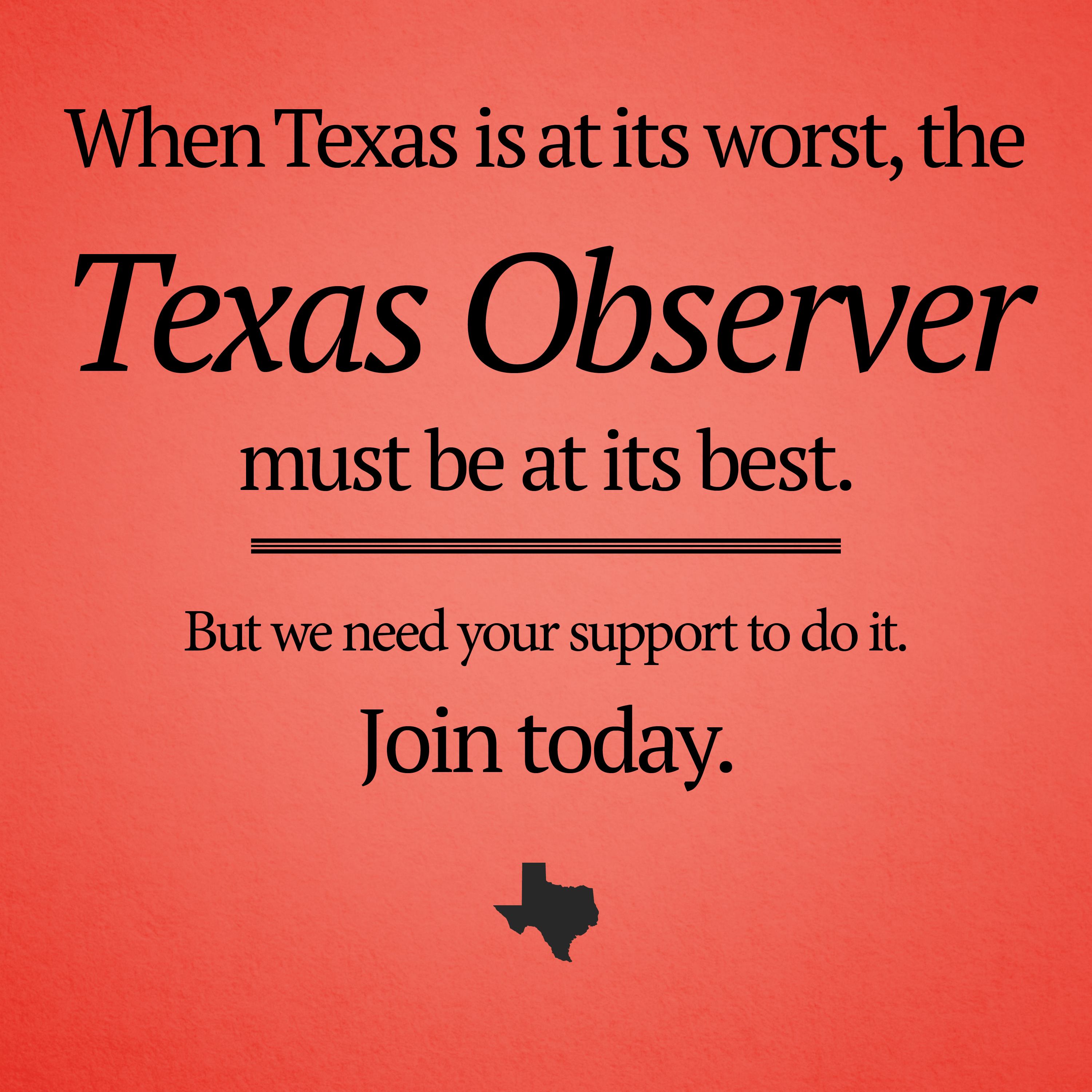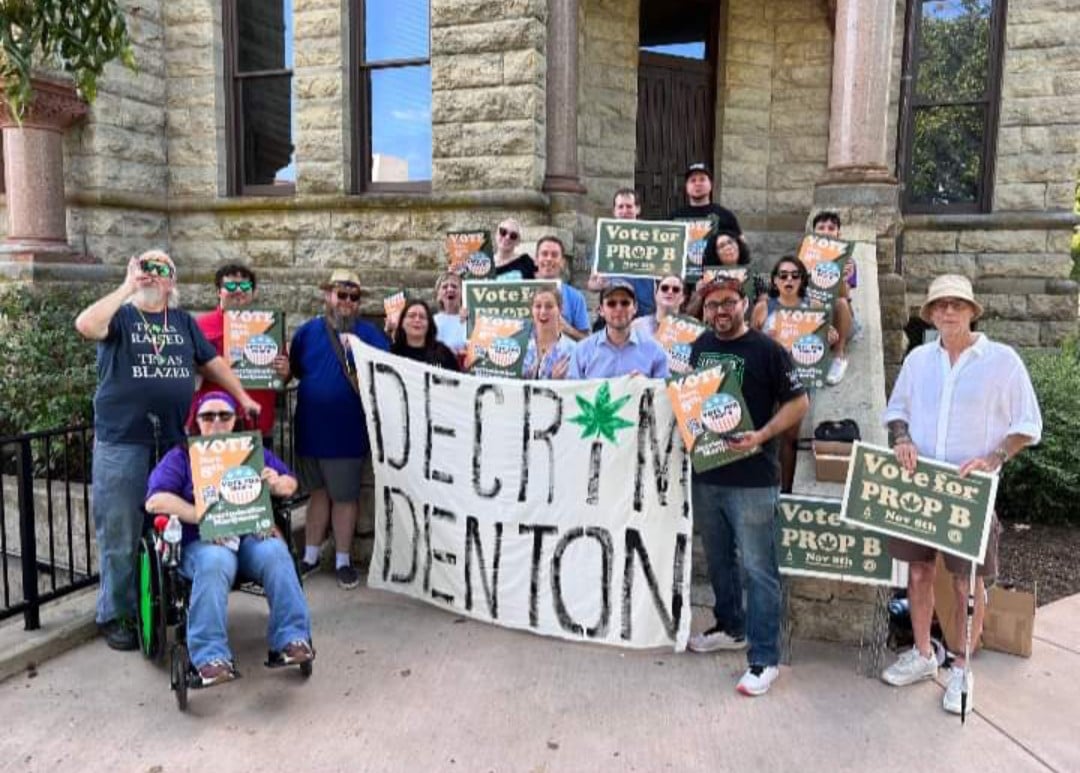
Local Initiatives for Cannabis Inspire Voter Turnout, Direct Democracy at Its Messiest
In some cities, enforcement of cannabis laws is way down. In others, a backlash has seen increased arrests.

Above: Ground Game Texas and Decriminalize Denton gather for the kickoff canvassing event in Denton Square.
In Texas, voters are unable to pass statewide ballot initiatives. But in some “home rule” communities, the city charter does allow for local voter initiatives. In several of these cities across the state—including Austin, San Marcos, and Killeen—residents have voted to change how police handle low-level marijuana crimes by passing initiatives to deprioritize misdemeanor marijuana charges, urging police to ignore them whenever possible.
A new report conducted by the nonprofit Ground Game Texas, which was key in advising the coalition in Killeen and several other Texas cities that have passed similar initiatives, shows that when these policies are successfully implemented in a community, they can keep hundreds of people, mostly people of color, out of jail.
“To restore faith in the power of our individual and collective voices, we need tangible victories,” said Catina Voellinger, the chief operating officer of Ground Game Texas. “We need those easy wins. And I think that these successes can rekindle that belief that our engagement can indeed shape the future of Texas.”
The Ground Game Texas report looks at the progress and setbacks of their local marijuana initiatives by studying the results of five successful votes in Denton, Elgin, Harker Heights, Killeen, and San Marcos. All five are “home rule cities” that have a charter allowing residents to put initiatives on the ballot. In 2022, voters enthusiastically passed the initiatives in all five cities—with results as high as 82 percent in favor in San Marcos—but from there, the outcomes differ greatly.
In some cities, such as Killeen and San Marcos, cannabis arrests are down and Ground Game Texas believes their efforts have kept hundreds of people out of local jails. In other towns, the opposite has occurred: Local officials have refused to accept the validity of the initiatives due to the conflict between state law and the new local ordinance, and in some cases—like Denton and Elgin—police have even increased enforcement and arrests of certain crimes. Regardless of the individual outcomes, Ground Game and its supporters praised the initiatives for their ability to bring young people and Black voters of all ages, which have lower rates of voter participation, to the polls.
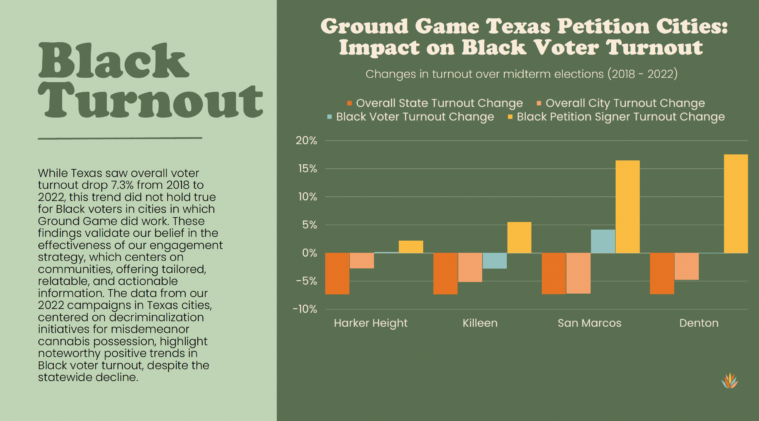
Jax James, executive director of Texas NORML, an organization that advocates for statewide marijuana law reform, emphasized the need to distinguish between legalization and decriminalization. Currently, marijuana remains federally illegal and banned statewide, except for a very limited medical marijuana program. Some forms of the plant known as hemp, grown with low levels of THC, the main ingredient that makes people feel high, were legalized in the state in 2019, leading to widespread confusion among police about how to enforce marijuana laws.
Legalization would mean the creation of a marketplace for the purchase of recreational cannabis. Although some bills for statewide decriminalization—making it legal to have marijuana by eliminating misdemeanor possession charges—have come under serious consideration in recent legislative sessions, a bill to fully legalize recreational marijuana has never even been voted on by a committee.
“I think that there is a desire to get [decriminalization] done because they do see the time and funds that are being wasted when we could be focusing on other things,” James said.
She also stressed the limitations of these local initiatives, using Austin as an example. The initiatives can only affect the behavior of local officials and law enforcement, but don’t affect sheriffs or police that operate at the county or state level. Although misdemeanor cannabis laws have been deprioritized by the Austin Police Department, Texas Department of Public Safety State Troopers, whose jurisdiction covers the whole state, can and do make marijuana possession arrests within the city limits.
“They bring life to the topic. They show support within these areas for this change.”
Even so, James praised the efforts of organizers who have passed these local initiatives. “They bring life to the topic. They show support within these areas for this change. They direct the local police department, but they don’t ultimately change the law or de facto ensure that you don’t get arrested for possession.”
The reduction in arrests since the passage of these initiatives is easily measured in communities like Killeen. According to public data obtained by Ground Game Texas, between January and June 2022, Killeen police arrested about 200 people for low-level marijuana charges, over 75 percent of them Black. From January to June 2023, police arrested fewer than 50 people for the same crimes (though still predominantly Black people). By comparison, just 39 percent of Killeen’s population is Black.
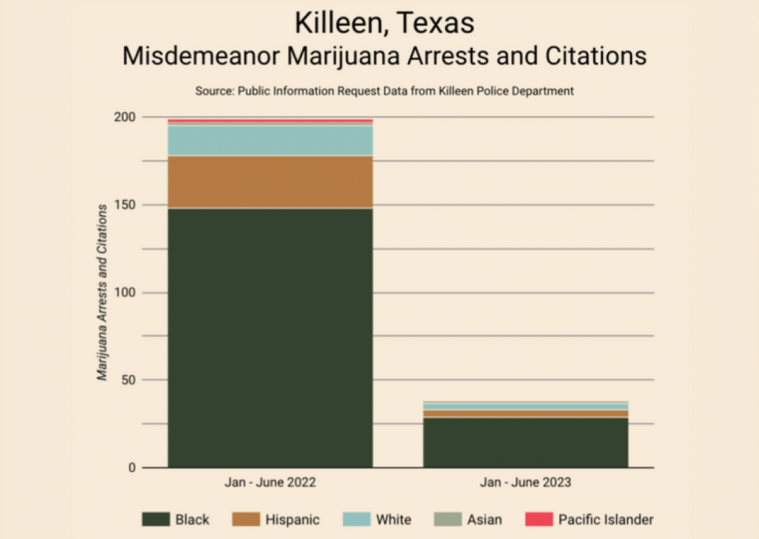
Catina Voellinger, the chief operating officer of Ground Game Texas, said police in Killeen rarely issued simple citations for marijuana, but instead took people to jail, where the average stay for all prisoners was 39 days. Not only are initiatives like these saving people from the adverse effects of time behind bars and needless encounters with the police, they also represent a reduction of spending on jails too. “As we go city by city, we are saving millions of dollars in public money,” Voellinger told us.
Even successful efforts like those in Killeen face challenges. Earlier this year, Bell County (home to Killeen and Harker Heights) voted to launch a lawsuit against the legality of the initiative, citing that a state law requires the “full enforcement” of all drug laws. Although arrests remain down, the initiative could still ultimately be struck down in the courts.
In other cities, the argument that state drug laws supersede these local initiatives has been used to disregard them entirely.
“People were really excited about this,” Courtenay Paris said of the cannabis initiative passed in Elgin.
Paris has lived in Texas her whole life and moved to Elgin four years ago from the Austin area. As a local activist and organizer, she praised Ground Game Texas for turning out voters in a midterm election, when fewer people typically come out to the polls. “I love the idea of getting more voters engaged in the democratic process,” she told the Texas Observer.
Paris led the campaign in Elgin to pass the initiative with support from Ground Game Texas and the local Democratic Party. She recruited friends and neighbors to sign petitions and put up yard signs. On election day in 2022, 70 percent of voters in the rural community backed the measure, and voter participation was way up. But so far, city staff have refused to implement the policy changes, and misdemeanor arrests for marijuana charges are up from four arrests between January and June 2022 to 15 arrests during the same time period this year.
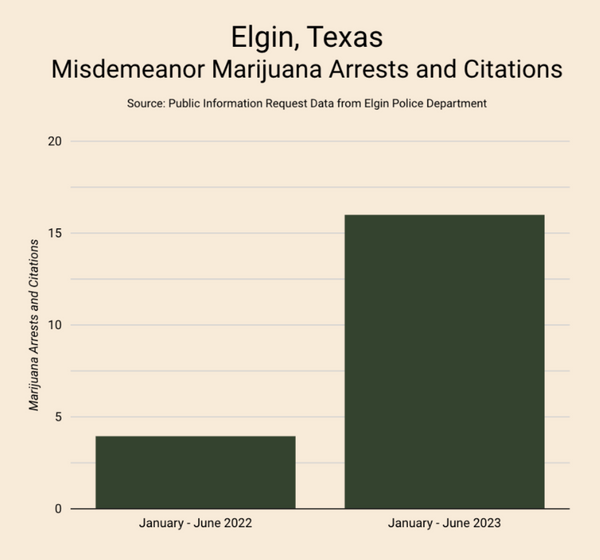
“Increasingly it feels like an effort is being made to directly negate what the people of this city did,” Paris said.
She hopes the voters respond by continuing to come to the polls and voting out the officials who defied their wishes when it comes to cannabis law reform. Despite the setbacks, Paris said she feels empowered to continue being involved in local politics.
“It doesn’t take much to have a meaningful impact on your community, the people around you, and that is my takeaway,” she said. “I’m going to continue doing that for sure.”
“It doesn’t take much to have a meaningful impact on your community, the people around you, and that is my takeaway.”
Ground Game Texas’ Voellinger agreed that these local efforts can build community power. The various local initiatives can also be used as models for other home-rule communities in Texas to organize around. While all the initiatives have directed police to deprioritize enforcement of misdemeanor marijuana crimes, each one is tailored to the local community. For example, the San Marcos and Denton initiatives forbid police from using the odor of marijuana when considering whether to make an arrest.
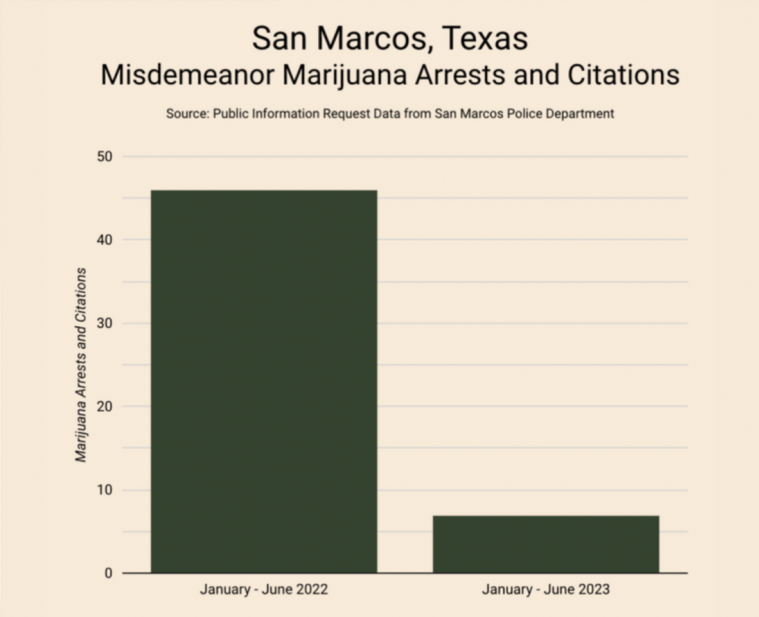
In San Marcos, misdemeanor marijuana arrests and citations fell from over 45 between January and June 2022 to just eight arrests and one citation during the same period of this year. And the successful local initiative left the community feeling empowered to make more changes, according to Sam Benavides, the communications director with Mano Amiga, a nonprofit that combats racist policies in communities between Austin and San Antonio. Their organization is now involved with an initiative for the 2024 election to decriminalize cannabis in Lockhart, and a unique initiative in San Marcos that, if passed, would repeal the civil service status of the police, opening them up to increased accountability by making it easier for them to be charged for laws they break in the line of duty.
“This comes after years of organizing for police accountability and pushing them to make changes to their city contract,” Benavides said.
Organizing for the cannabis initiative helped lay the groundwork for this second, more complex initiative in San Marcos, she said: “Because we’ve built that petition culture here, I think people will see this as a legitimate effort to enact change.”
The report from Ground Game Texas illustrates the possibilities of local initiatives, but also their limitations. Catina Voellinger explained that Ground Game Texas is using these initiatives to build local power and show voters the potential they have when they collectively demand change in their communities. They’re now supporting efforts to pass a similar initiative in Lubbock. When cities refuse to enact policies, she suggested that it can light a fire in residents that motivates them towards further action and gives them targets for that action by identifying legislators who are resistant to change.
“Seeing that disregard for democracy … you rekindle people’s spirits and give them the tools necessary to combat it. This tells us it’s just one more battle; this tells us we haven’t lost, we just have more work to do.”
